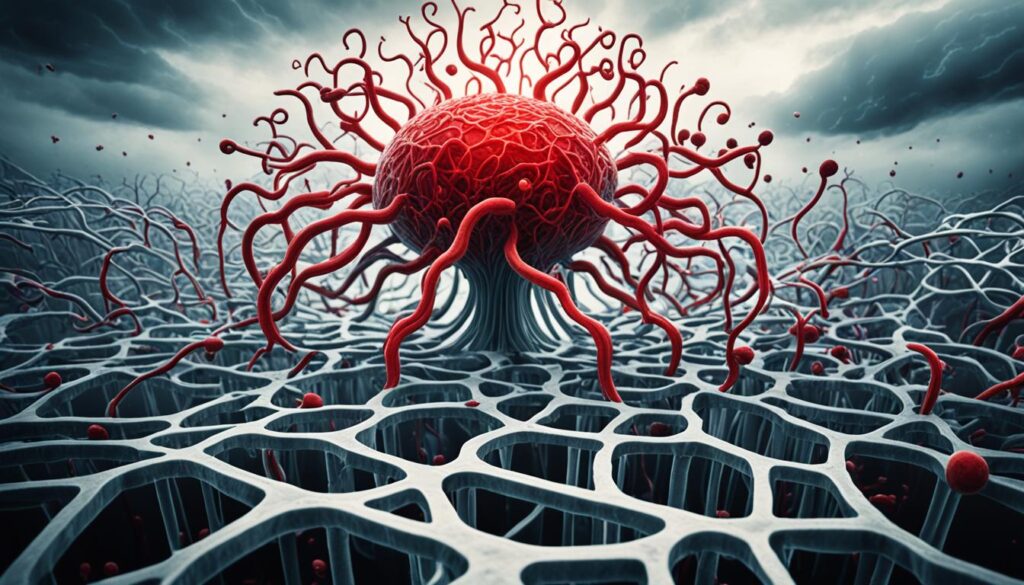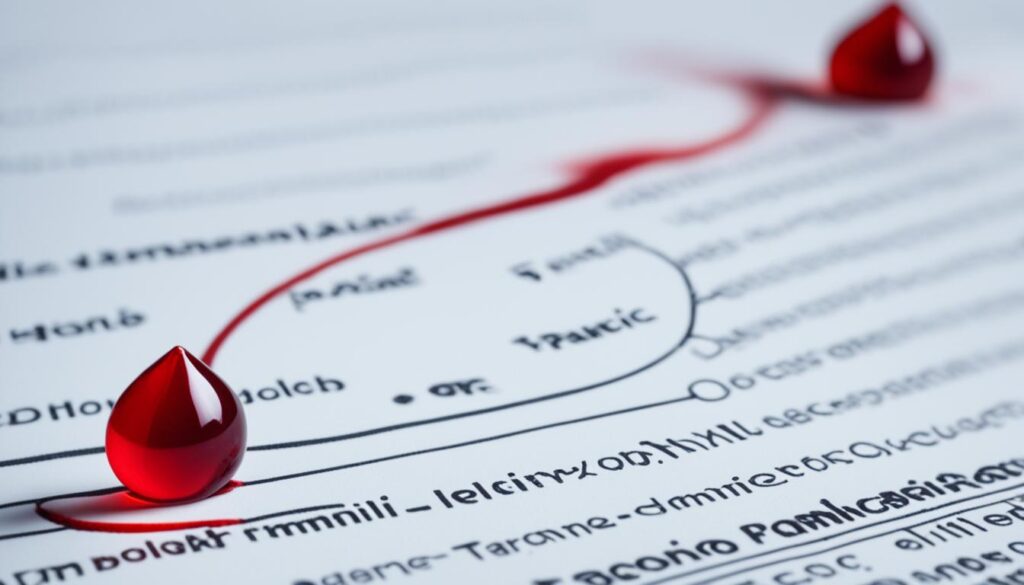Ever thought about how your blood type might hint at your mental health? I found myself wondering: Could your blood type tell you if you’re more likely to have panic attacks? Looking into understanding panic attacks and blood type, we see a fascinating mix of blood science and mental health. Panic attacks, those sudden waves of fear and physical changes, might not just happen by chance. They could be linked to something as simple as your blood type, showing how our biology affects our emotions.
Panic attacks are more than just feeling stressed; they’re intense and can make your heart race and your breathing fast. I wondered why these happen, and I found some interesting facts about how our blood type might play a part. Studies suggest a strong link between blood type and panic attack correlation. They show how our blood type could affect our mental health in ways we’re still learning about.
Key Takeaways
- Exploration of the possible correlation between blood type and susceptibility to panic attacks.
- Understanding of physical symptoms that manifest during a panic attack.
- Insights into the impact of blood type on mental health conditions.
- Examination of how our blood type may influence our emotional responses.
- Discussion on the latest research linking blood type to certain psychological traits and disorders.
Understanding Panic Attacks: Symptoms and Triggers
Panic attacks can surprise people, bringing on intense fear and physical signs that feel like a real emergency. It’s key to know what panic attacks are, what causes them, and their symptoms to handle them better.
Defining Panic Attacks and Their Physical Manifestations
Panic attacks are sudden waves of overwhelming anxiety and fear. They come with strong physical signs like a racing heart, sweating, shaking, and trouble breathing. Some might feel like they’re not in touch with reality or fear they’re having a heart attack.
Identifying Common Triggers of Panic Attacks
Finding what causes panic attacks can be hard, as they can happen for no clear reason. But, stress, past traumas, or big changes in life can set them off. Your genes and how your body reacts to changes can also trigger them.
Exploring the “Fight or Flight” Response in Panic Episodes
When you have a panic attack, your body thinks there’s a real danger, even if there isn’t. This starts a “fight or flight” response. It makes your heart race and your adrenaline go up, getting your body ready to act fast. This is a key survival instinct that, when wrongly triggered, causes the symptoms of a panic attack.

| Symptom | Experience Time | Common Triggers |
|---|---|---|
| Heart palpitations, Sweating | 5-20 minutes | Immediate stress response |
| Shortness of breath, Chest pain | Up to 1 hour | Traumatic events, Life changes |
| Trembling, Nausea | Varies | Genetic predisposition, Body sensitivity |
Understanding panic attacks means knowing their signs and what causes them. Learning how to handle the “fight or flight” response can also help lessen panic attacks. This can improve your life quality.
Exploring Theories Behind Panic Attacks
We’re on a journey to understand panic attacks better. Looking into different theories helps us grasp why they happen. By exploring causes and the link to serotonin levels, we can manage them better.
The Role of Brain Chemistry and Serotonin Levels
Serotonin is key to our mental health. It keeps our mood stable and helps us feel good. When serotonin levels drop, it can lead to feelings that cause panic attacks. This makes studying panic attack and serotonin levels very important.
Research like Graeff’s 2012 study shows how serotonin and other brain pathways work together. It helps us understand how our brains react to stress.
Investigating the Physiological Pre-Cursors to an Attack
Looking into panic attack prevention by blood type, researchers find important clues. They’ve found that brain blood flow issues in some people can lead to panic attacks. This info helps doctors find new ways to stop attacks.
Learning about blood type and mental health shows us that our body’s signs, like heart rate and platelet counts, affect our mental health. By linking these signs to panic symptoms, we’re getting closer to preventing panic disorders.

This knowledge helps me understand my own panic attacks and join the discussion on panic attack triggers and how to stop them. Dealing with panic attacks requires looking at many factors, like biology, psychology, and environment. By focusing on research and patient care, we can help those who struggle with panic attacks.
By deeply studying understanding panic attacks, we can tackle this challenge more effectively. We aim for a future where panic attacks are seen as signs of deeper issues we can fix.
Blood Type Influence on Panic Attacks: Myth or Reality?
Looking into the link between blood type and panic attack correlation is important. We need to separate what’s believed culturally from what science says. The idea that blood type affects panic attacks is interesting but often mixed up with other health issues.
In some Asian countries, people believe blood type shapes your personality, from jobs to love lives. But when it comes to mental health, like panic attacks, blood type theories aren’t widely accepted. For example, in Japan, type A is seen as creative but also anxious. This might lead people to think type A’s are more prone to panic attacks.
| Country | Belief/Health Risk | Source Validity Concern |
|---|---|---|
| Japan | Type A associated with anxiety traits | Cultural belief, not scientifically proven |
| United States | Type A linked to higher stomach cancer, heart disease risks | Scientific studies support |
| Taiwan/Korea | Blood type personality classifications popular | Cultural belief, lacks scientific evidence |
Despite these beliefs, there’s no solid science linking blood type to panic attacks. Before jumping to conclusions, we should check the sources of these claims. Studies like those on DSM-IV disorders don’t find a link between blood type and panic disorders.

The debate on blood types and their effects on personality and health is common. But, there’s little proof linking blood type to panic attacks. It shows we should be careful where we get our info and trust evidence-based research more when talking about blood type and panic attacks.
As we learn more about how our bodies affect our minds, it’s clear blood type and panic attacks aren’t linked by science. This tells us to be careful with the info we share, especially in today’s fast-spreading online world.
Preventive Measures and Managing Panic Attacks
Understanding panic attack prevention by blood type is key. We can use blood type knowledge to help manage panic attacks. There are many strategies that can help, depending on your blood type.
Breathing Techniques and Cognitive Strategies
Dealing with anxiety starts with learning how to breathe properly. When you have a panic attack, your breathing gets fast and shallow. By practicing slow, deep breathing, you can stop an attack before it starts.
This method helps with physical symptoms like dizziness and fast heartbeats. It also helps you use your blood type to manage panic attacks better.
Cognitive strategies are also important. They help you change negative thoughts that cause panic. By facing your fears in a safe way, you can make panic attacks less severe and less frequent.
Interventions: Medication and Cognitive Behavioral Therapy
For more serious cases, medication can help. Beta-blockers like Propranolol can control a racing heartbeat during a panic attack. SSRIs and benzodiazepines like Xanax can also help by balancing chemicals in the brain that affect anxiety.
Cognitive Behavioral Therapy (CBT) is another great option. It teaches you about panic attacks and how to handle them. You learn specific techniques based on your own triggers and symptoms. Studies show that CBT can make attacks less intense and less frequent over time.

These strategies offer a comprehensive way to manage panic attacks. They can be tailored to your individual needs, including your blood type. From simple breathing exercises to complex treatments like medication and CBT, there are many ways to find relief from panic and anxiety.
Conclusion
I’ve looked closely at how mental health and biology are linked, focusing on understanding panic attacks and blood type. A study with 315 students showed that blood type O was most common, while type A was least. Yet, the study found no link between blood type and stress, anxiety, or depression. This was checked using strong statistical methods like ANOVA and MANOVA.
The idea of using blood type to manage panic attacks is still up for debate. But, we know that proven treatments like cognitive-behavioral therapy and medication work well. The Quality of Life Questionnaire shows that these treatments help people with anxiety, no matter their blood type. They focus on how the person feels, not their blood type.
So, while studying blood type and panic attacks is interesting, we don’t have strong evidence yet. The data shows that mental health is complex. It’s more about a person’s mind and environment than their blood type. I aim to share insights that help people find effective ways to fight panic attacks. These strategies are based on science and care.
FAQ
Can my blood type influence the likelihood or severity of a panic attack?
There’s not much proof that blood type affects panic attacks. Most studies look at brain chemistry, genes, and stress, not blood type.
What are the common symptoms of a panic attack?
Panic attacks have symptoms like a fast heartbeat, sweating, and shaking. You might also feel short of breath, have chest pain, or feel like you’re going to lose control.
What triggers panic attacks?
Panic attacks can start from stress, big changes in life, or scary events. Sometimes, they come out of nowhere with no clear reason.
How does the “fight or flight” response relate to panic attacks?
The “fight or flight” response gets ready for danger by changing your body. In a panic attack, this happens by mistake, even if there’s no real danger. This leads to strong physical and emotional symptoms.
Are certain blood types more prone to mental health issues like panic attacks?
There’s no strong proof that certain blood types make you more likely to have panic attacks.
How can I prevent a panic attack from happening?
To stop panic attacks, try to manage stress with relaxation, exercise, and a good diet. Also, get enough sleep and stay close to friends and family. Sometimes, you might need therapy or medicine to help.
What role does serotonin play in panic attacks?
Serotonin helps control our mood. If serotonin levels are off, it can lead to anxiety and panic attacks. It affects how we handle stress and emotions.
How can breathing techniques help during a panic attack?
Breathing techniques can slow down your fast breathing during a panic attack. This can lessen the physical symptoms and help you feel calmer, making it easier to manage the attack.
Are there effective treatments for panic attacks?
Yes, panic attacks can be treated. Effective treatments include cognitive-behavioral therapy to change how you react to fears. Some medicines can also help manage symptoms and reduce attacks.
Is blood type related to the management of panic attacks?
Blood type isn’t a factor in treating panic attacks. There’s no strong evidence linking it to the condition. Treatment focuses on symptoms, triggers, and mental health strategies.
Source Links
- Correlation between Preoperative Anxiety and ABO Blood Types: Evidence from a Clinical Cross-Sectional Study
- Blood Type Matters for Brain Health
- Panic disorder
- Panic and Anxiety
- Biological and cognitive theories explaining panic disorder: A narrative review
- Biological and Clinical Markers in Panic Disorder
- Blood Type Personality: Understanding Ketsueki-gata
- GAD Myths & Realities | Anxiety and Depression Association of America, ADAA
- Anxiety and Anxiety Disorders in Children and Adolescents: Developmental Issues and Implications for DSM-V
- How to stop a panic attack: 13 effective methods
- How Anxiety Can Fuel a Panic Attack — and What to Do Next
- Panic Attacks and Panic Disorder – HelpGuide.org
- The Role of Blood Groups in Health Anxiety, Marital Adjustment, and Quality of Life in Nurses
- The relationship between blood types and anxiety, stress, and depression in university students
